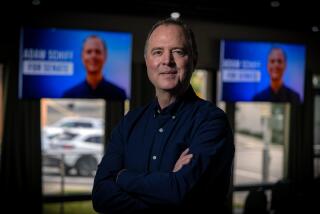Cranston’s Broad Body of Work
- Share via
Alan Cranston, during his 24 years representing California in the U.S. Senate, was an old-fashioned liberal Democrat who fought for peace, justice and human rights. At the same time, he was a prodigious fund-raiser quick to come to the aid of California business and industry. Cranston was a vigorous advocate of arms control but became a staunch supporter of the controversial B-1 bomber because it was built in California. He enjoyed the campaign support of executives from both parties, insulating him from strong election challenges.
As the No. 2 Democrat in the Senate, Cranston was a deal maker who could be counted on to assemble the majorities needed to win key votes. Yet to millions of Californians, he was a distant and slightly strange figure--a tall, gaunt former track star who remained a competitive runner into his senior years and preached nuclear arms control long after he had left the Senate and the Cold War had ended.
Cranston, 86, died Sunday at his home in Palo Alto, eight years after leaving the Senate under a cloud because of his involvement with Charles H. Keating Jr., the failed savings and loan chief who was indicted on charges of looting the firm’s assets and cheating depositors out of their savings. Keating had contributed more than $1 million to Cranston’s campaigns and causes. Accused of interceding with federal regulators on Keating’s behalf, Cranston was reprimanded by fellow senators for “an impermissible pattern of misconduct.” Grudgingly he accepted his 1991 punishment while insisting he had done nothing unethical. Cranston announced the next year that he would not seek a fifth term because he was being treated for prostate cancer. Political experts thought he would have had difficulty winning reelection because of the Keating matter.
Despite the setback, Cranston, right up to his death, continued to pursue his lifelong passion for arms control through his Global Security Institute. During his time in the Senate, Cranston also battled ably for the preservation of California’s mountain and desert wilderness.
Many of Cranston’s contributions will be overshadowed by the Keating affair, but also because he was not inclined to tout his own achievements. As his son, Kim, recalled, then-Senate leader Lyndon B. Johnson told Cranston when the Californian first joined the Senate: “There are two kinds of senators: show horses and workhorses. You’re a workhorse.”
Indeed, Cranston toiled in the trenches during a long political career in behalf of California and world peace. The value of his efforts and dedication was not fully appreciated at the time and was overshadowed by his departure from the Senate. It’s that body of work that should be remembered and celebrated now.
More to Read
Get the L.A. Times Politics newsletter
Deeply reported insights into legislation, politics and policy from Sacramento, Washington and beyond. In your inbox three times per week.
You may occasionally receive promotional content from the Los Angeles Times.










